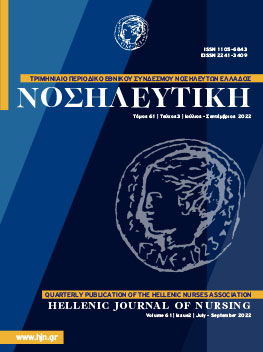Sociodemographic, Psychological and Clinical Profile of Greek Patients with Rheumatic Diseases Undergoing Treatment in Primary Care
Rheumatic diseases represent a broad spectrum of usually chronic conditions that can affect multiple organ or/and systems. Their impact involves not only physical performance and difficulty to perform professional or everyday tasks due to their symptoms but also uncertainty regarding personal performance, psychological distress, anxiety and depressive symptomatology with consequent effects on their family, professional and social life, and even on family income. Aim: The aim of this study was to describe the sociodemographic characteristics and the clinical profile through the assessment of certain characteristics and clinical parameters of patients with rheumatic diseases treated at a public outpatient rheumatology clinic in Athens. Material and Method: Sociodemographic and clinical data (gender, age, marital status, religion, occupation, educational level, comorbidity, pain etc.) was collected: (a) from the medical records of the patients, (b) during the patients’ regular follow-up visit between July 2015 and July 2016, by using a specific questionnaire. Moreover, participants were also asked to complete Zung Self-Rating Depression Scale (SDS) and Anxiety Scale (SAS). Statistical analysis was performed with the SPSS statistical software package, version 23.0. Results: The majority of participants were female (61.1%) and the age group of patients >50 years old was the most represented (47.22%). 46.31% of the sample had a university-level education and the higher proportion of participants (55.56%) were married and employed (66.67%); while the 37.96% had left their job because of their disease. Rheumatoid arthritis was the most common rheumatic disease (45.37%), followed by psoriatic arthritis, (23.15%), ankylosing spondylitis (20.37%), and systemic lupus erythematosus (11.11%). More specifically, 68.52% of patients had disease in remission but 53.71% of them stated that they experienced moderate or severe pain. It is noted that the 28.7% of those patients used antidepressant or antianxiety medication. 22.22% of the female participants had experienced a miscarriage in the past. According to our findings, 44.6% and 41.5% of the sample were assessed with a degree of depression and anxiety, respectively. More specifically, 25% were assessed with moderate to severe depression, while 21.3% exhibited moderate to severe anxiety. Conclusions: We found a considerable prevalence of depressive and anxiety disorders in our study and consequently an early screening in these patients is highly recommended. Out results contribute to a better understanding of the clinical, psychological and sociodemographic characteristics of patients with rheumatic diseases. This knowledge can be of great importance for the early recognition of potential risk factors and the design of nursing interventions aimed at reducing the impact of the disease on the patient’s life and the appearance of psychological disorders, as well as improving the well-being of the patients with rheumatic diseases.
| Category: | Τόμος 56, Τεύχος 3 |
| Hits: | 21487 Hits |
| Created Date: | 15-09-2017 |
| Authors: | Afroditi Zartaloudi , Ioannis Koutelekos , Maria Polikandrioti , Spiridoula Stefanidou , Dimitrios Koukoularis , Eleni Kyritsi |
 English
English  Ελληνικά
Ελληνικά 

